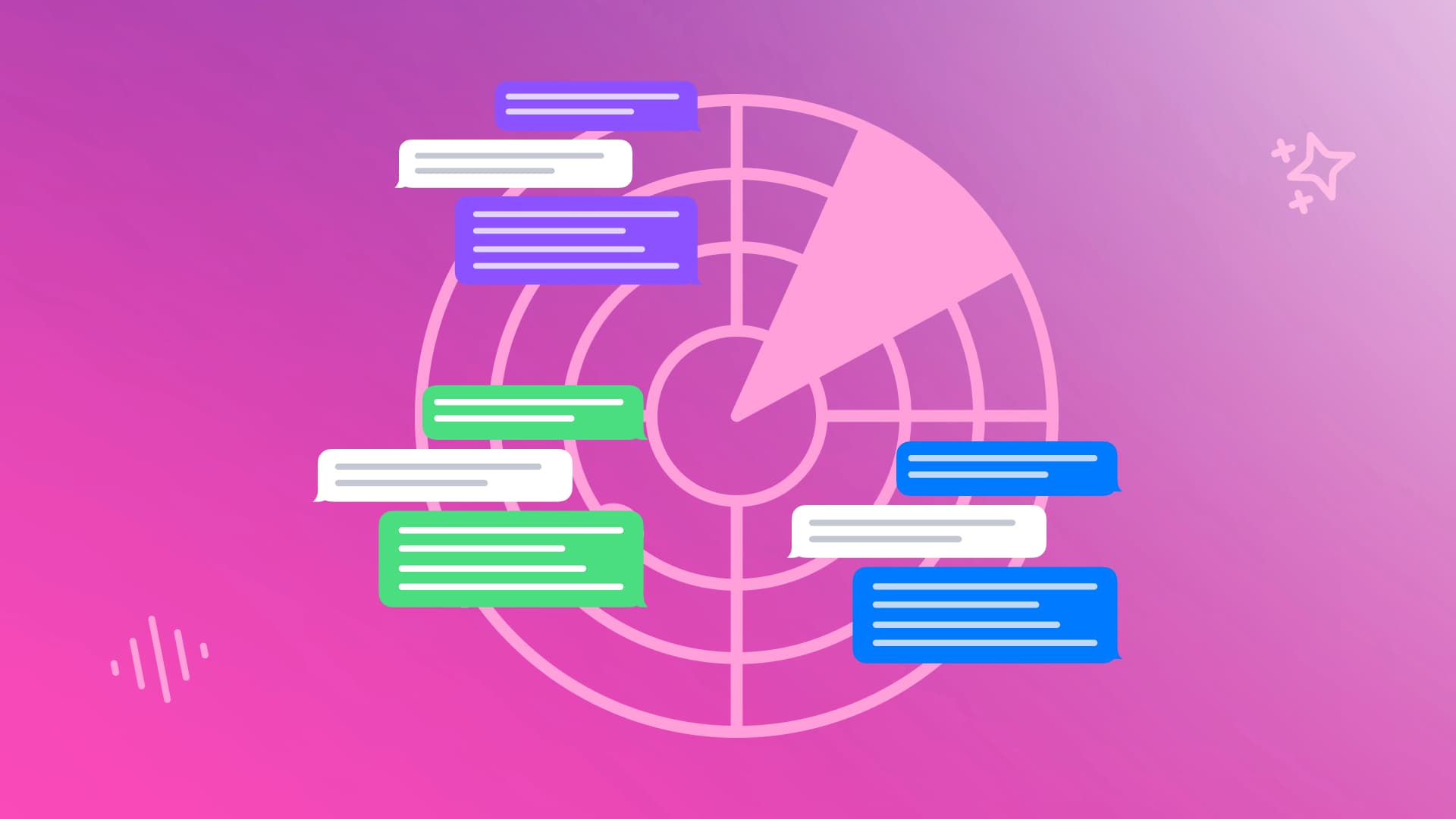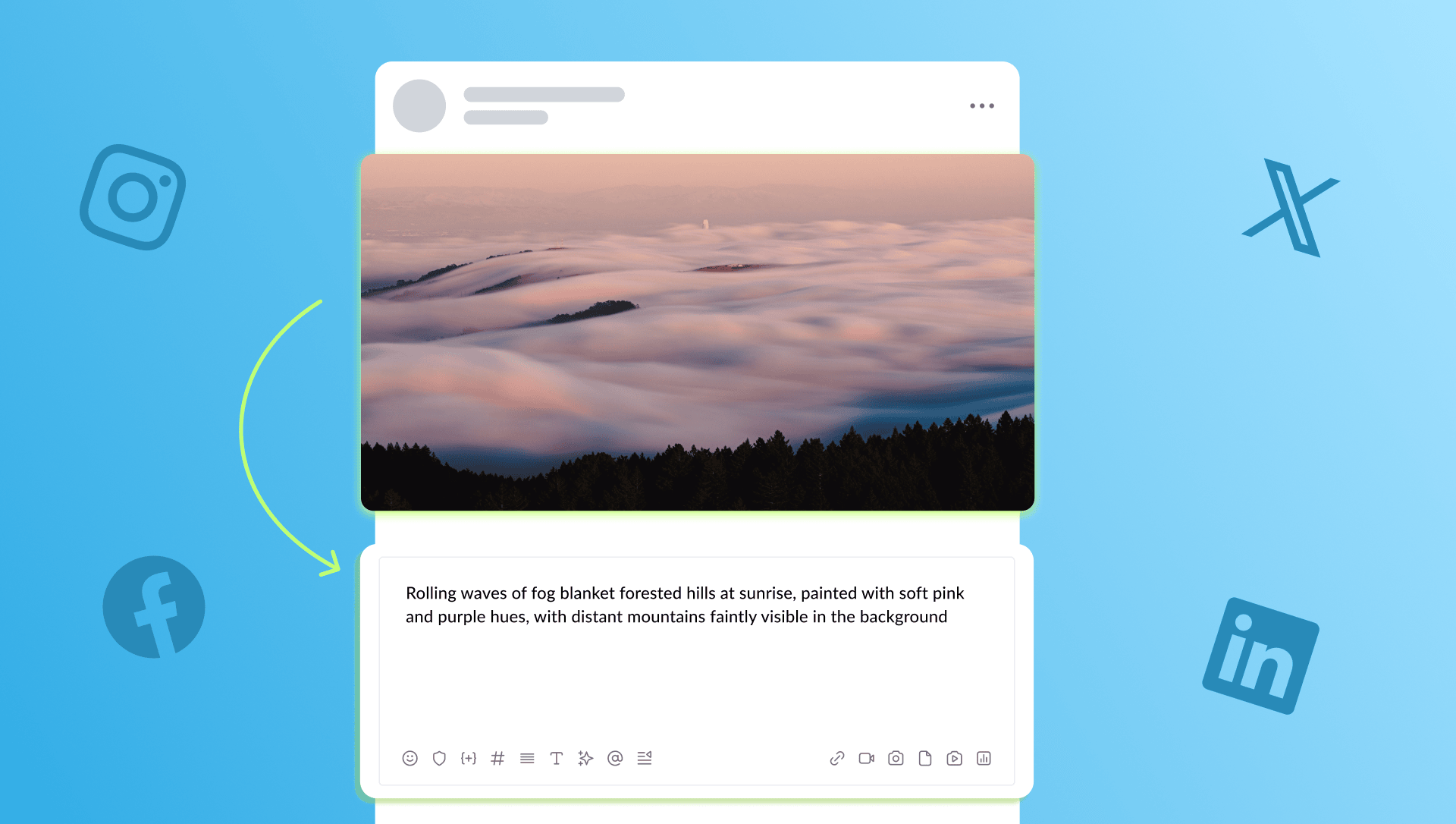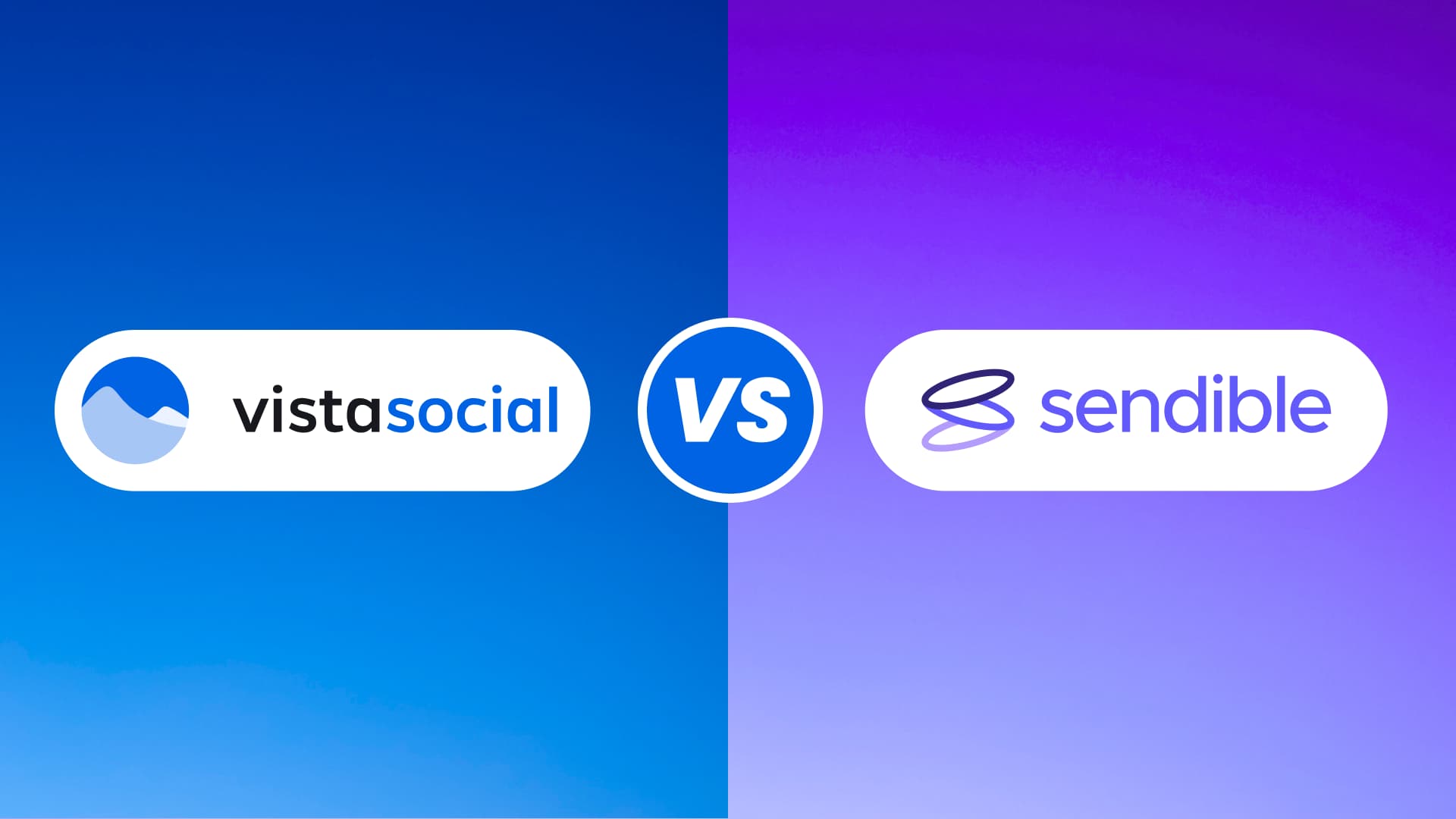New
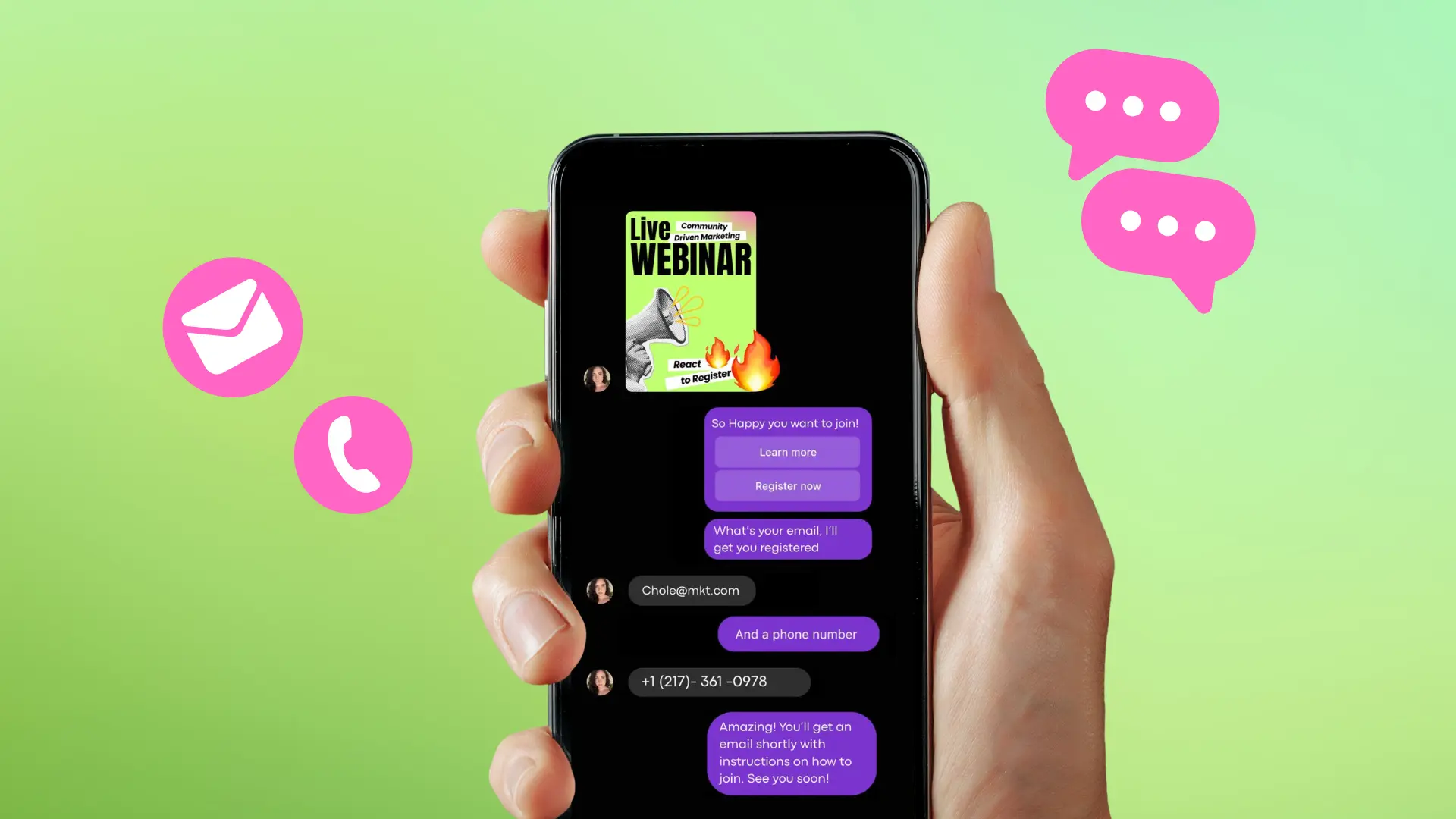
Turn Your DMs Into Lead Gen!
Learn how to collect lead data from your DMs such as email addresses, phone numbers, and more right from your social inbox. If you are not yet automating your DMs your competitors are outpacing you.

How Something Social Saved 75% of Their Time and Increased Revenue by 15%
See how a fast-growing agency improved operations, cut down hours of manual work, and unlocked new revenue opportunities with Vista Social.
New
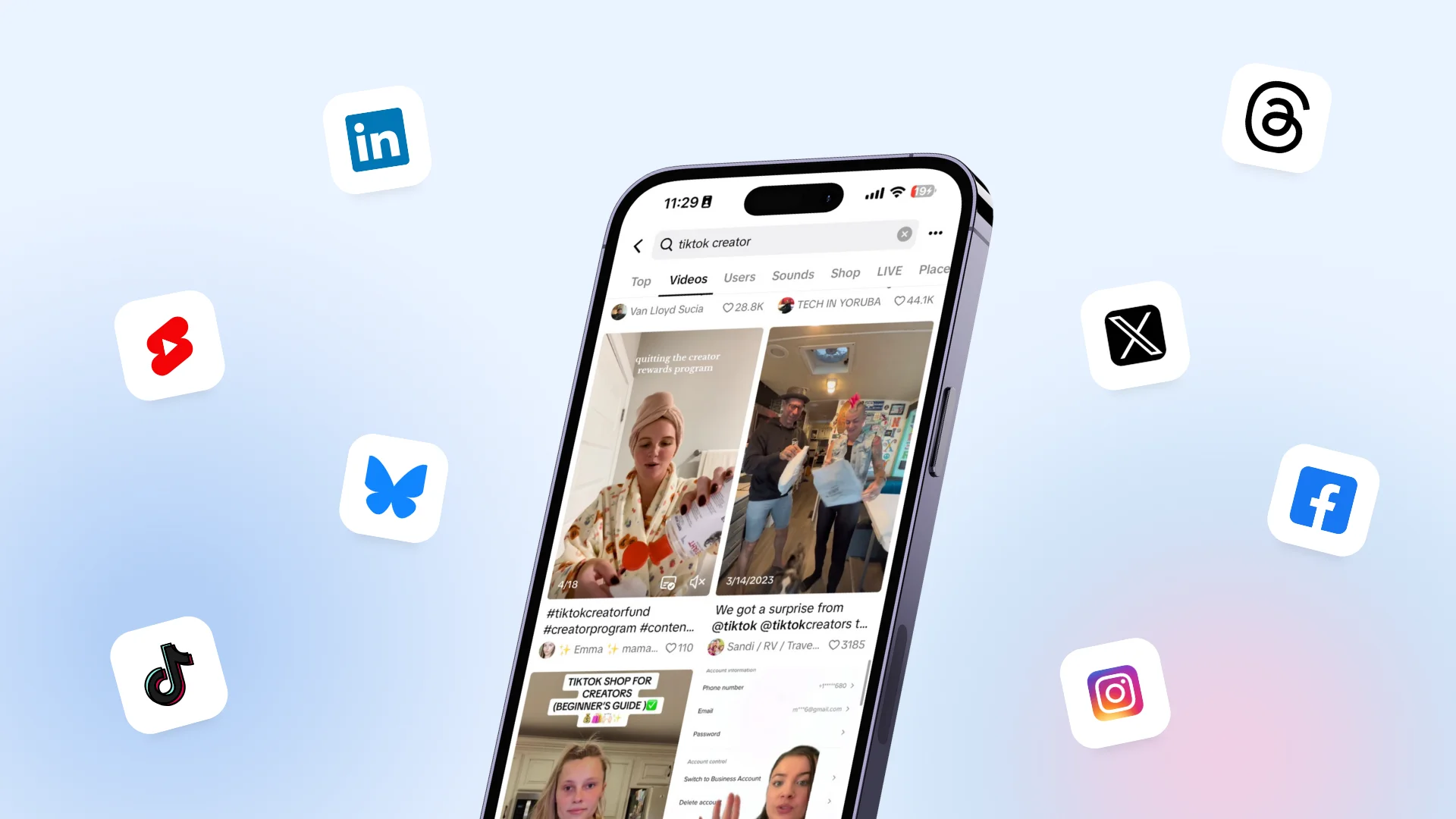
50 Unique Social Media Ideas for Consistent Content Creation
Discover 50 unique social media post ideas to engage your audience, grow your brand, and maintain a consistent content strategy with ease!
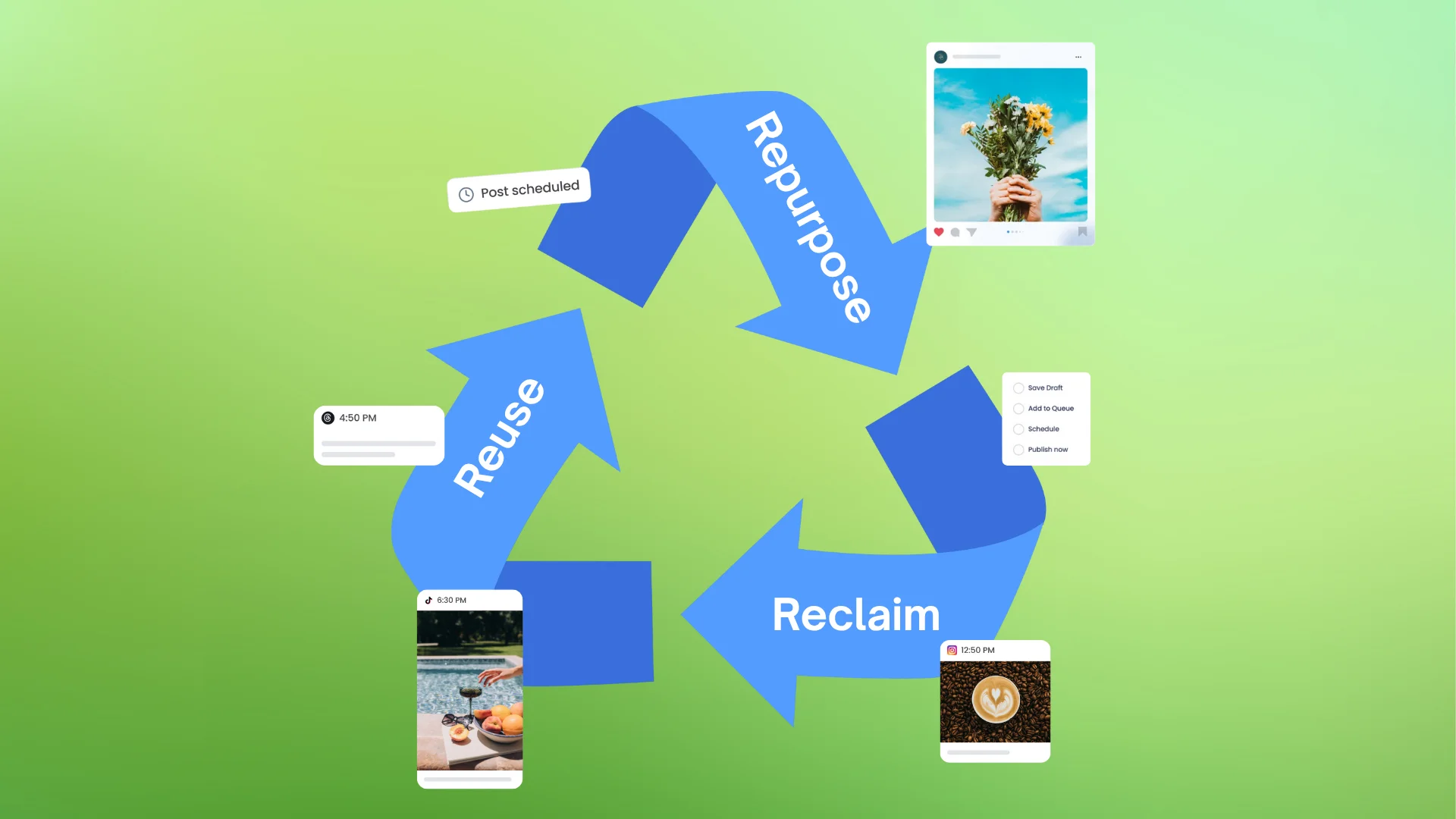
Mastering Content Reuse: The Key to a Consistent and Sustainable Posting Strategy
Published on April 21, 2025
12 min to read
Social Listening ROI: How to Use Social Listening to Boost Revenue
Summarize with AI
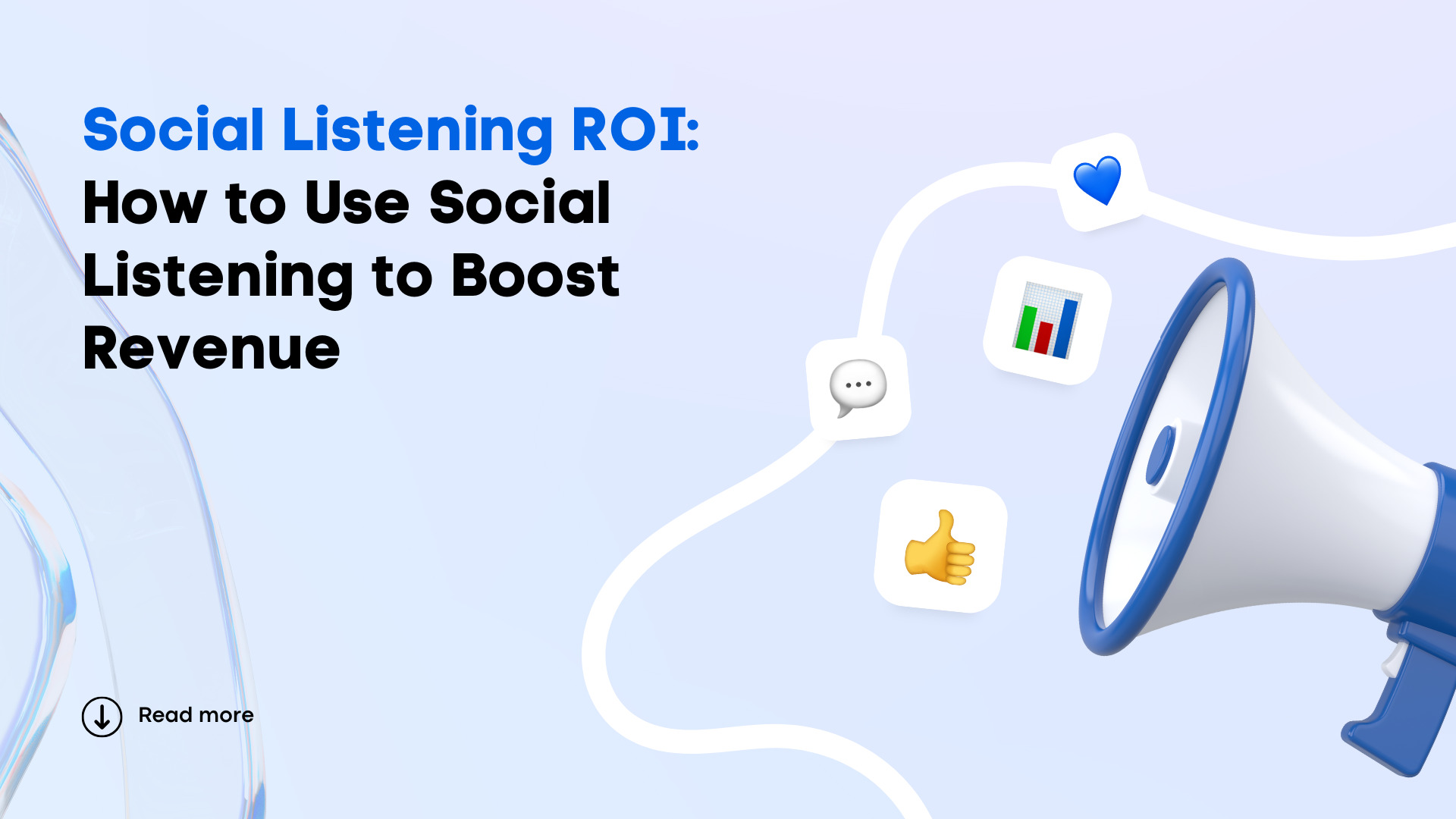
Summarize with AI
ChatGPT
Claude
Perplexity
Share
Vista Social
X (Twitter)
Table of contents
Summarize with AI
ChatGPT
Claude
Perplexity
Share
Vista Social
X (Twitter)
Are you having trouble proving social listening ROI to your clients?
You’re not alone.
Investing in the latest tools is easy, but if you’re not turning all that data into real results, you’re leaving money on the table.
Think: Missed opportunities, unclear impact, and social media marketing strategies based on hunches rather than insights.
That’s why it’s time to move beyond just tracking mentions.
With the right strategy and tools, social listening can help you uncover buying signals, refine messaging, and drive real revenue for your clients.
In this post, we’ll share tips and tricks to use social listening to turn conversations into conversions and prove that listening is 100% worth your clients’ investment.
Table of contents
What you will learn
- What is social listening ROI?
- Why is measuring social listening ROI important?
- 6 Tips to use social listening to increase revenue
- Track social listening ROI easily with Vista Social
- Key metrics to track to measure social listening ROI
- What are the common challenges of measuring social listening ROI?
- FAQs on social listening ROI
- Social listening ROI: Turning conversations into conversions
What is social listening ROI?
Social listening Return on Investment (ROI) is the value you get from tuning in to what people say online and using that information to make smarter social media marketing moves.
Essentially, it is the return on investment in social listening platforms and strategies that support your clients’ social media marketing and business goals.
Must read: Top 10 Social Media Listening Platforms in 2025
Social listening ROI is about turning online conversations into insights that do something, such as helping you uncover what your client’s target market cares about.
It also involves spotting trends before they go viral or catching potential issues before they snowball.
Using social listening insights to tweak your clients’ campaigns, jump into relevant conversations, and improve their products can help you drive real results.
Why is measuring social listening ROI important?
Tracking the ROI of your social listening efforts is crucial for the following reasons.
Show the value of your efforts to your clients
Let’s be real—your clients want genuine results, not just reports.
Tying social insights to real outcomes, such as more sales, engagement, or customer retention, proves that your listening strategy works.
Secure more budget or tools
Showing that social media listening leads to faster audience responses, better content, or revenue-generating ideas makes it waaayyy easier to justify investing in better platforms or more team resources.
Must read: Social Media Monitoring vs. Social Media Listening
Prioritize what works
Measuring the ROI of social listening helps you cut the fluff and focus on the insights that move the needle.
This way, you’re not just listening, but acting purposefully and, in turn, driving real results.
Create a smarter feedback loop
Social listening isn’t a one-and-done thing.
When you track social listening ROI, you learn what insights pay off and which help you fine-tune your strategy over time.
Prove impact beyond vanity metrics
Likes and impressions are crucial to your social listening efforts, but don’t always tell the whole story.
Measuring listening ROI helps you connect social insights to real business outcomes, such as product improvements, customer loyalty, and campaign performance.
Make data-driven decisions
When you can quantify what’s working, you’re not just guessing—you’re making strategic moves based on what your clients’ target audiences want and need.
That’s how you help your clients’ brands stay ahead of the curve and their competition.
Track progress over time
Measuring your clients’ social listening ROI gives you a benchmark.
You can see how your listening strategy evolves and what trends you’ve helped clients successfully jump on.
It can also show you how those actions have paid off.
It’s like your own highlight Reel for wins.
Strengthen cross team collaboration
Sharing ROI-backed insights with product, customer service, or sales teams makes social listening a company-wide asset, not just a marketing tool.
When everyone sees the value of social listening, they’re more likely to act on your findings.
Boost credibility and influence
Do you want a seat at the strategy table?
Showing how social listening drives revenue or reduces churn helps build trust in your expertise and elevate the role of social media within the bigger business picture.
6 Tips to use social listening to increase revenue
Leverage social listening to boost your clients’ revenue with the tried and true tips below.
1. Spot buying signals in real time
Social media is constantly full of people asking for recommendations, venting frustrations, and sharing wishlists.
These posts can be prime opportunities to offer a solution: your clients’ products.
Below are a few tips for social listening to detect buying signals live.
- Use social listening tools to track phrases such as “anyone recommend,” “looking for,” or “need a new (product/service)”
- Track relevant hashtags and keywords related to your clients’ niches
- Set up alerts for brand and competitor mentions, especially around common customer questions and concerns
Suppose someone posts, “Desperately need a new planner that won’t fall apart in two months—any faves?”
You (or your client’s brand account) jump in with: “We’ve got you covered! Our planners are designed to last all year ✨ Here’s a link + 10% off code!”
It’s a great way to provide help while catching potential customers right at the decision-making stage, leading to higher conversions.
2. Identify gaps in the market
Audiences often say what they want, but if you don’t listen closely enough, you can easily miss it.
Follow the quick tips below to ensure your social listening efforts effectively capture audience interests, needs, and preferences.
- Scan social conversations for recurring complaints, frustrations, or product wishlists, especially on competitor posts
- Use insights from social listening to suggest product tweaks or new offerings
- Work hand in hand with your clients’ product or development teams to turn feedback into solutions—a key advantage of partnering with a software outsourcing company.
Let’s say you manage social media for a snack brand and notice people saying, “I wish they had a peanut-free option.”
You take that insight to the product team, and within a few months, a new peanut-free flavor launches—and becomes a top seller.
Giving your clients’ audiences exactly what they’re asking for can increase customer satisfaction, leading to higher sales.
3. Fine tune your messaging
Do you want your clients’ social media posts to connect with audiences better?
Listen to how audiences describe their needs, feelings, and experiences—and use their words.
Below are a few tricks to do this strategically.
- Track reviews, comments, and discussions about your product (or others in your space)
- Pay attention to the adjectives, phrases, or emotions social media audiences use
- Use that language in your clients’ social media posts, ad copy, and landing pages
Let’s say customers keep saying that your client’s analytics software “takes the headache out of reporting” or “saves them hours.”
You update your client’s messaging to focus on saving time and simplifying work, instead of listing features.
As a result, your client’s engagement and click-through rates start climbing.
So, what does this tell you?
Messaging that resonates more can result in higher conversions and better ROI on content.
4. Monitor competitors and fill in their gaps
Your social listening efforts shouldn’t just focus on your clients’ brands.
Listening in on the people’s feedback on your clients’ competitors can be just as valuable.
Conduct competitor listening seamlessly with the tips below.
- Set up listening streams for competitor brand names, hashtags, and product keywords
- Look for service complaints, pain points, or gaps in the features of the competitors’ products or services
- Use your gathered intel to guide how you position your clients’ brands and their products’ benefits
Let’s say your competitor’s customers are complaining about slow shipping.
You take note—and run a campaign highlighting your clients’ fast, free two-day delivery.
You track the sentiment shift as customers mention your client’s brand as a better alternative.
The likely result?
Your client gains new customers by strategically positioning their brand as a better, more fitting solution than their competitors.
5. Fuel better ad targeting and campaigns
If your clients’ audiences already tell you what matters to them, why guess what messaging will work?
With the quick tips below, capitalize on your social listening insights to refine your ad targeting and clients’ social media campaigns.
- Use social listening to determine trending topics, content themes, or pain points across social media platforms where your clients are active
- Use the insights to create test ad angles, visuals, or hooks across your clients’ social media content
- Track which messages drive the most engagement organically, then amplify them with paid social media ads if needed
Suppose you notice a wave of posts praising your client’s eco-friendly product packaging.
You create a campaign around that Unique Selling Point (USP) such as, “The packaging that’s good for your skin—and the planet.”
It crushes your client’s Click-Through Rate (CTR) benchmarks and becomes their top-performing ad.
The strategic move can result in better-performing campaigns, stronger brand perception, and lower Cost Per Acquisition (CPA).
6. Find and amplify User Generated Content
Social media users could already be creating content about your clients’ brands.
Social listening helps you find this content, celebrate it, and extend its reach.
Here’s how you can do this effectively.
- Set up alerts for brand mentions, product tags, and niche hashtags
- Engage with and repost User-Generated Content (UGC) featuring your clients’ brands (with permission and attribution)
- Highlight top creators or customers in your social media content strategy
Must read: 20 Top Social Media Strategies for SaaS Companies this 2025
For example, a micro-influencer posts a glowing unboxing video of your client’s product on TikTok.
Must read: TikTok Social Listening: Complete Guide [2025]
You discover it via social listening, comment to engage, then ask to reshare it on your client’s TikTok and Instagram feeds and their website.
It drives a horde of new followers and gets picked up by a few media outlets.
If done successfully, this can provide social proof, increase brand trust, and boost your client’s organic reach—all without you or your client spending on creating new content.
Track social listening ROI easily with Vista Social
Listening is only half the battle—the real value comes from proving that your efforts drive real impact.
With the social media management platform Vista Social, tracking social listening ROI is strategic and simple, as the step-by-step guide below shows.
Step 1: Set up Listeners to monitor brand mentions
Go to the social media Listening module in your Vista Social dashboard.
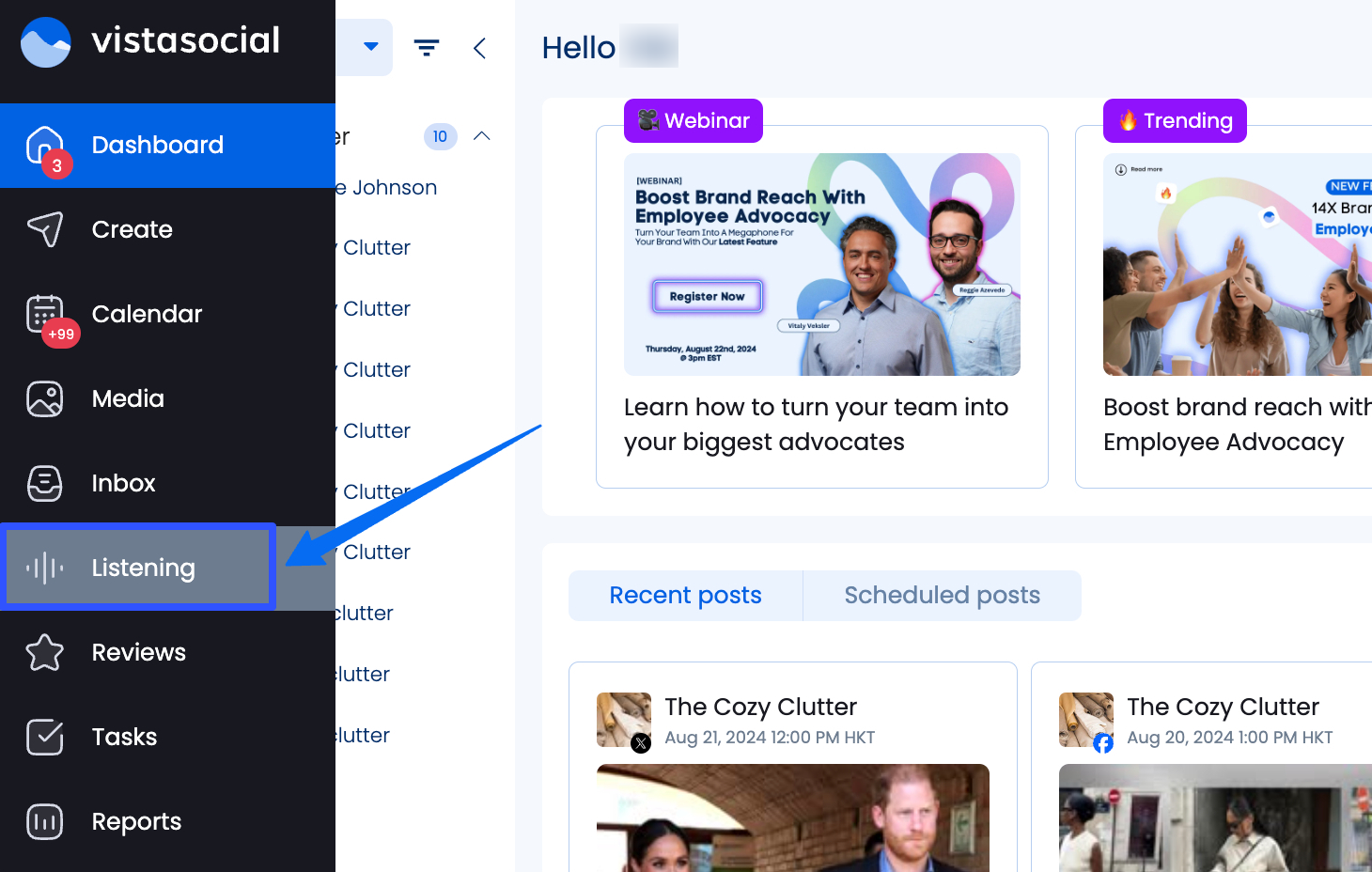
Click Create Listener to monitor specific keywords, phrases, hashtags, brand names, or competitors.
Select the + Add listener option.
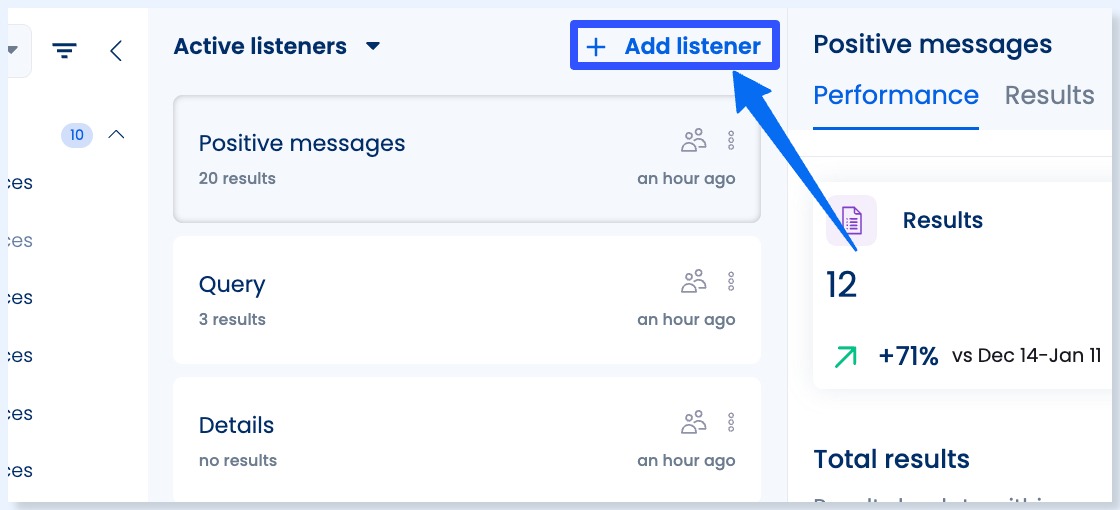
Select whether you want your Listener to track conversations, comments, and messages within your clients’ connected social profiles or across other social networks and websites.
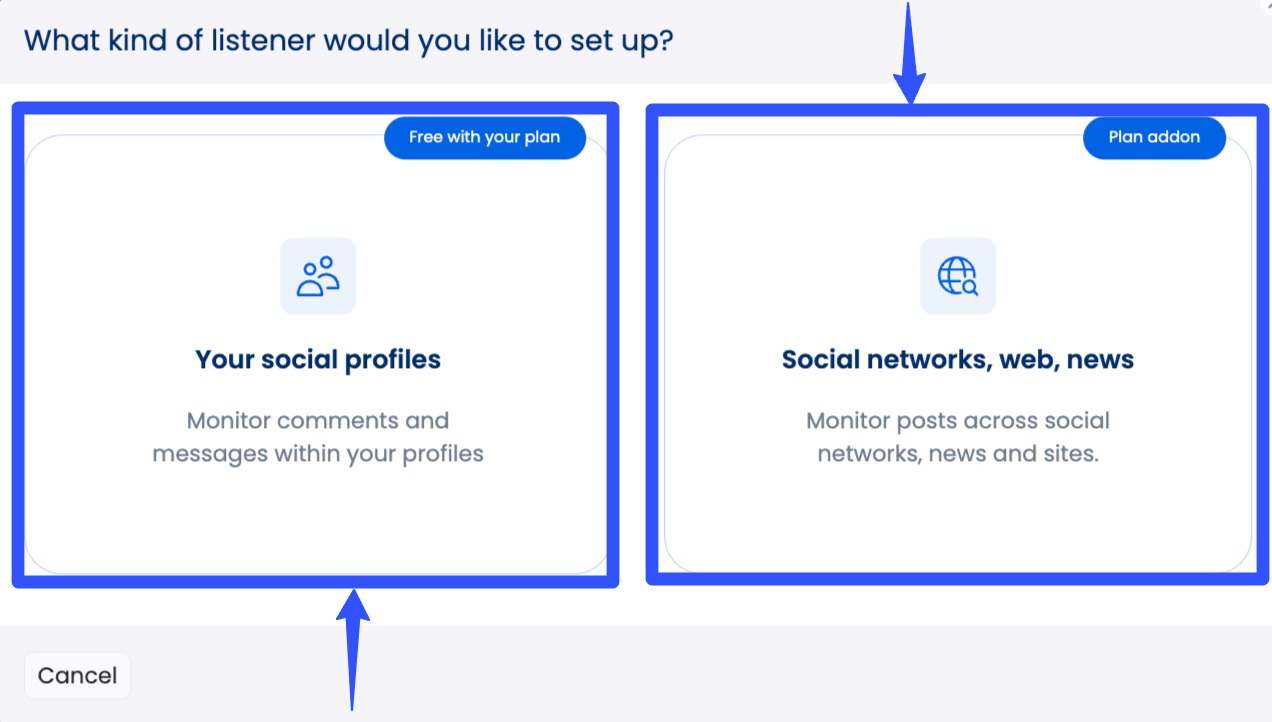
Next, name your Listener and write a description.
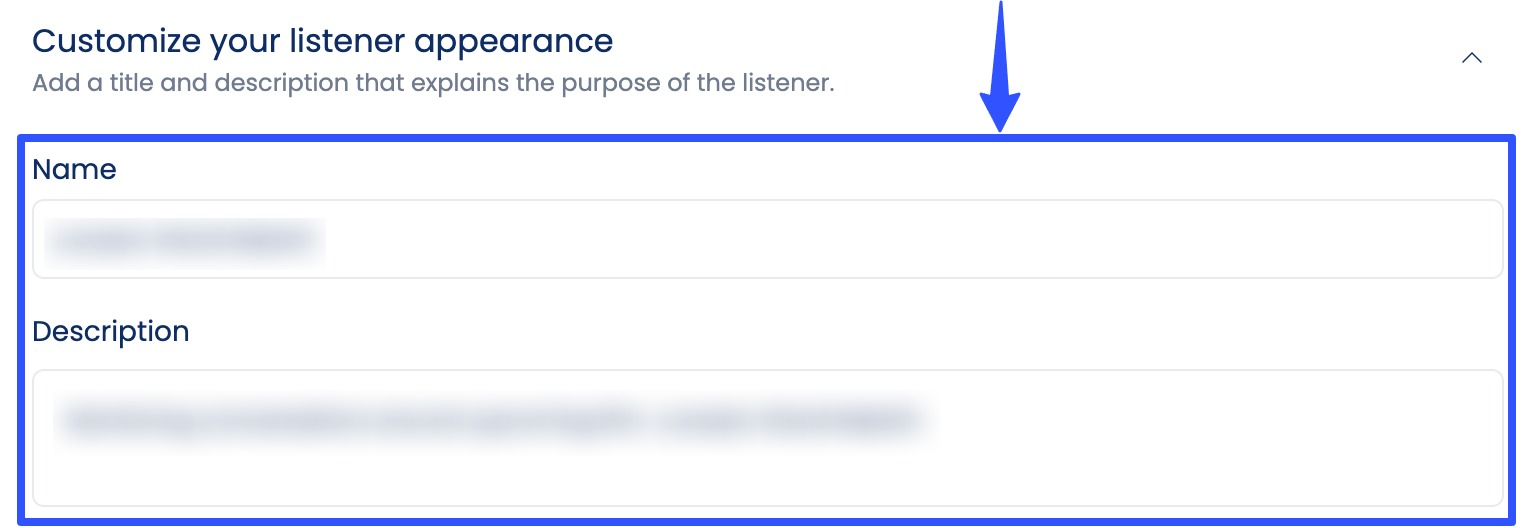
Customize your Listener by choosing:
- Keywords to track, such as your client’s product and brand names, for your query
- Platforms to monitor (source)
- Language and location filters
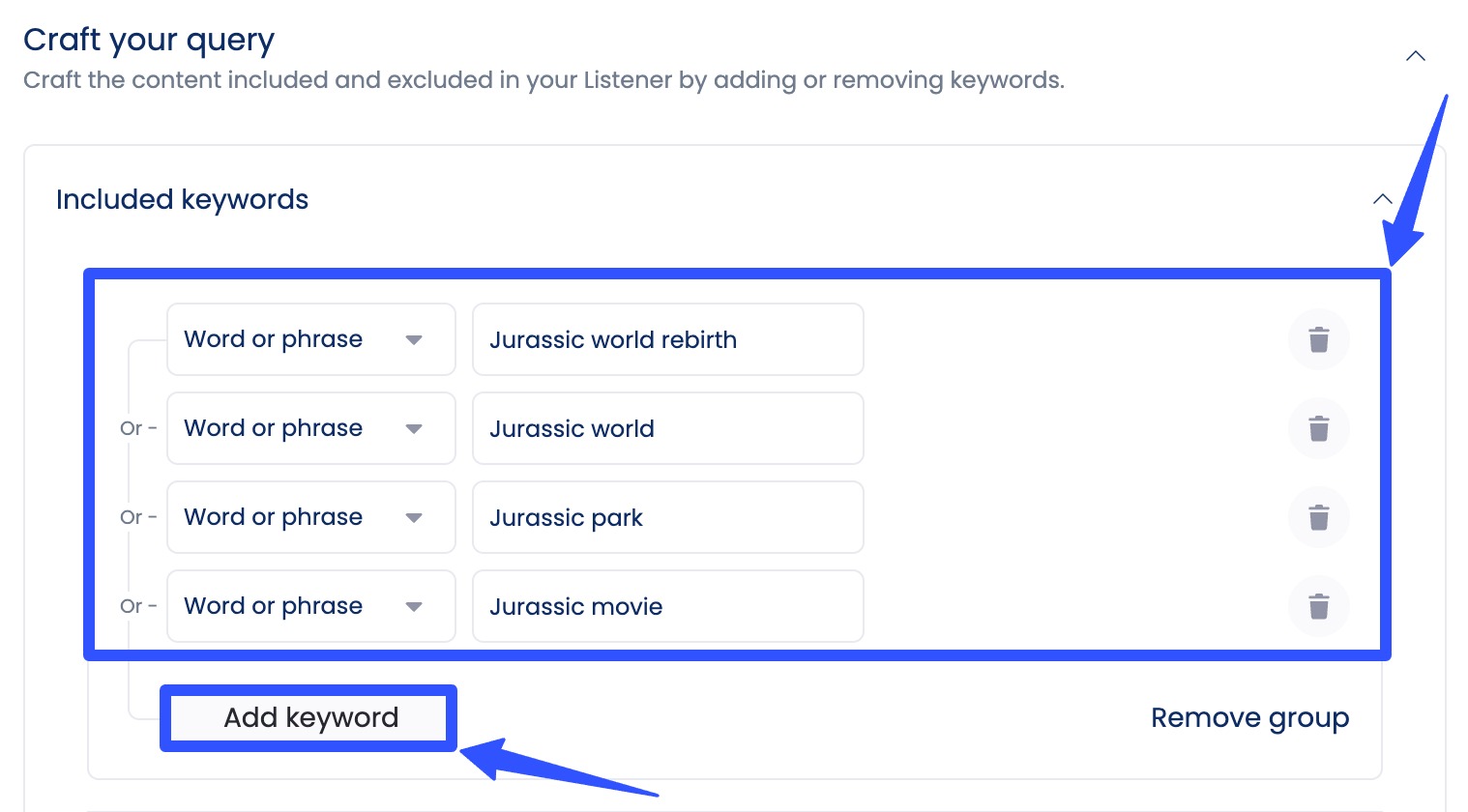
Additional tip: Use a mix of branded and industry-specific terms to get a fuller picture of your clients’ audience sentiment.
Step 2: Analyze sentiment and conversation trends
Once your Listener is active, Vista Social pulls in mentions from your specified sources.
All the conversations your Listener pulled are automatically tagged with a sentiment icon (positive, negative, mixed, or neutral) to give you quick insights.
You can filter the pulled conversations based on sentiment.

Click individual mentions to understand their context and respond accordingly.
Must read: Influencer Rates & Pricing: How Much Do Influencers Charge?
Doing so can help you:
- Spot emerging PR risks or brand advocates and influencers
- Identify the tone of conversations around your clients’ social media campaigns
- Track how audience and brand sentiment shift over time
The Listener results show your Listener’s performance, including overall sentiment, impressions, etc.
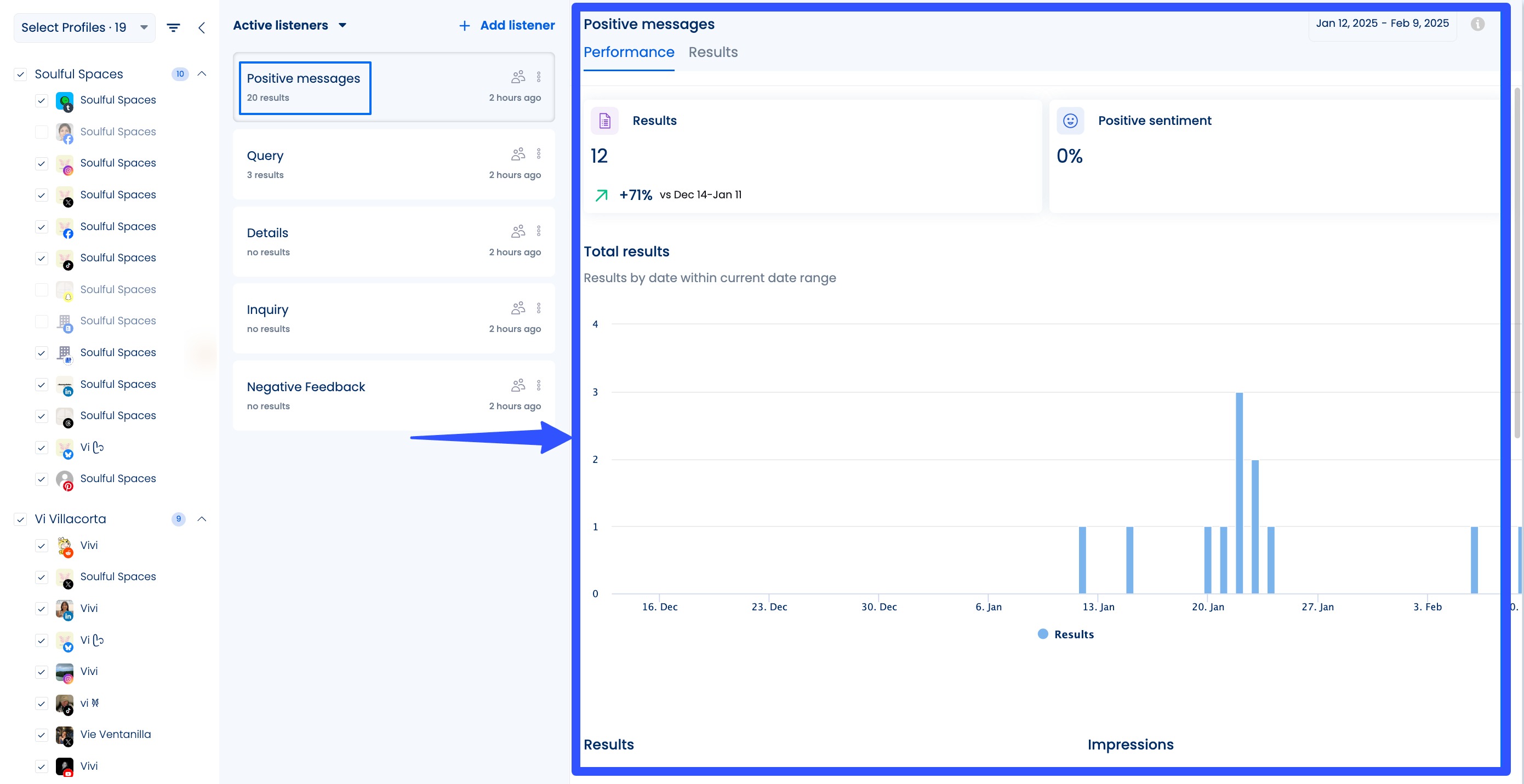
The insights can help you determine whether your social listening efforts are paying off.
Vista Social lets you schedule your social listening performance and other social media reports to auto-generate on a specific time, date, and frequency.
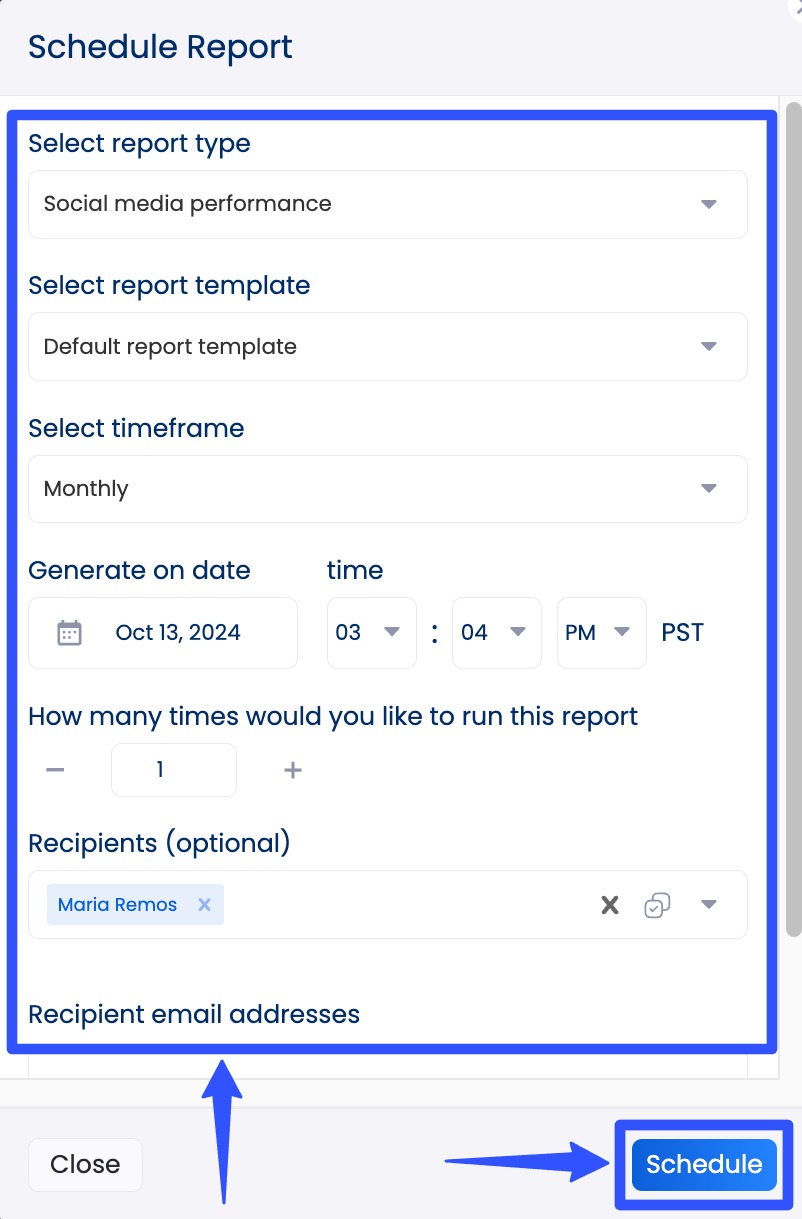
You can export your reports to PDF or CSV files or share them using interactive links.
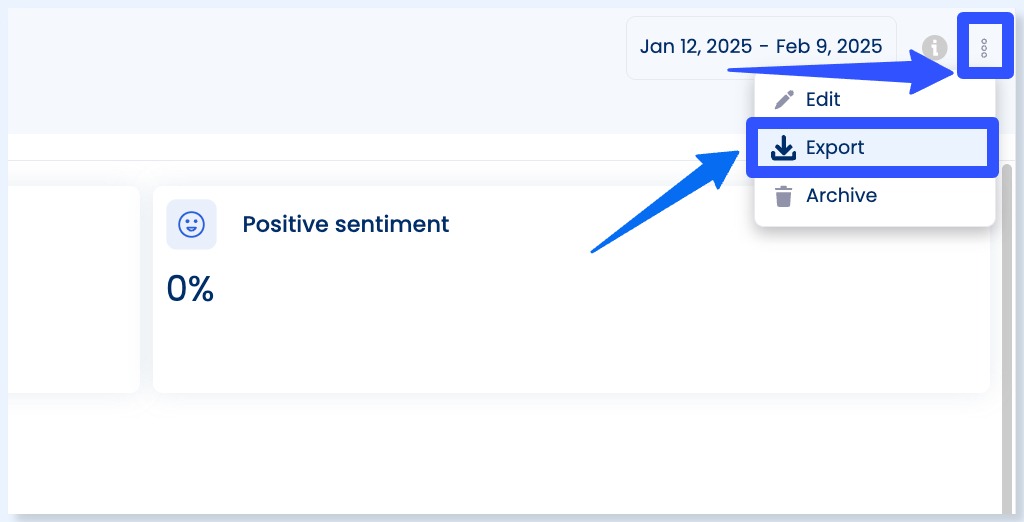
Step 4: Build custom reports that highlight ROI
Vista Social’s social media analytics feature lets you combine your data into powerful, easy-to-read reports.
Go to Reports > Report Builder.

Select + Add template.
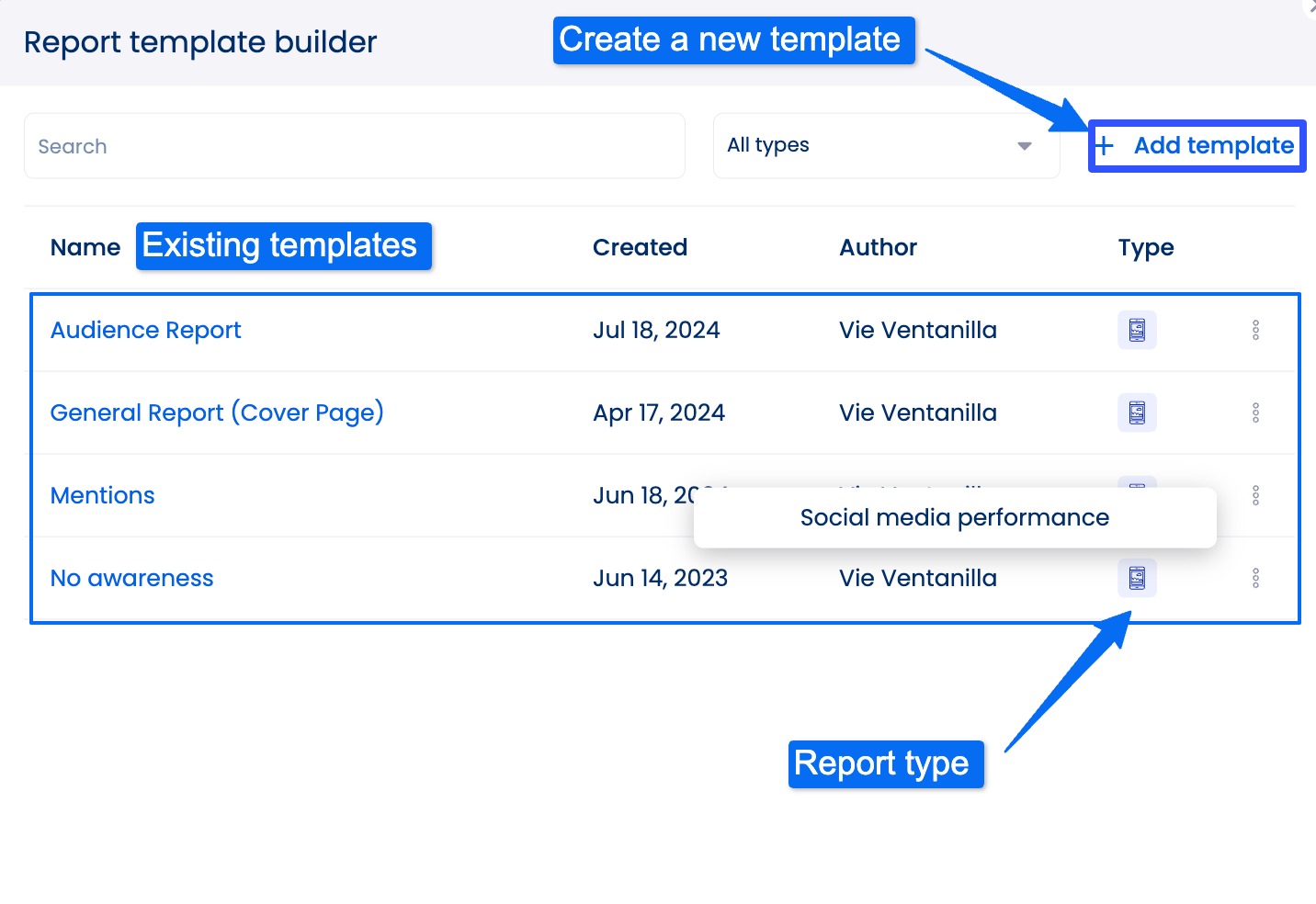
Choose your report type, such as Listener Performance or Sentiment Analysis.
Must read: How to Perform Social Media Sentiment Analysis this 2025
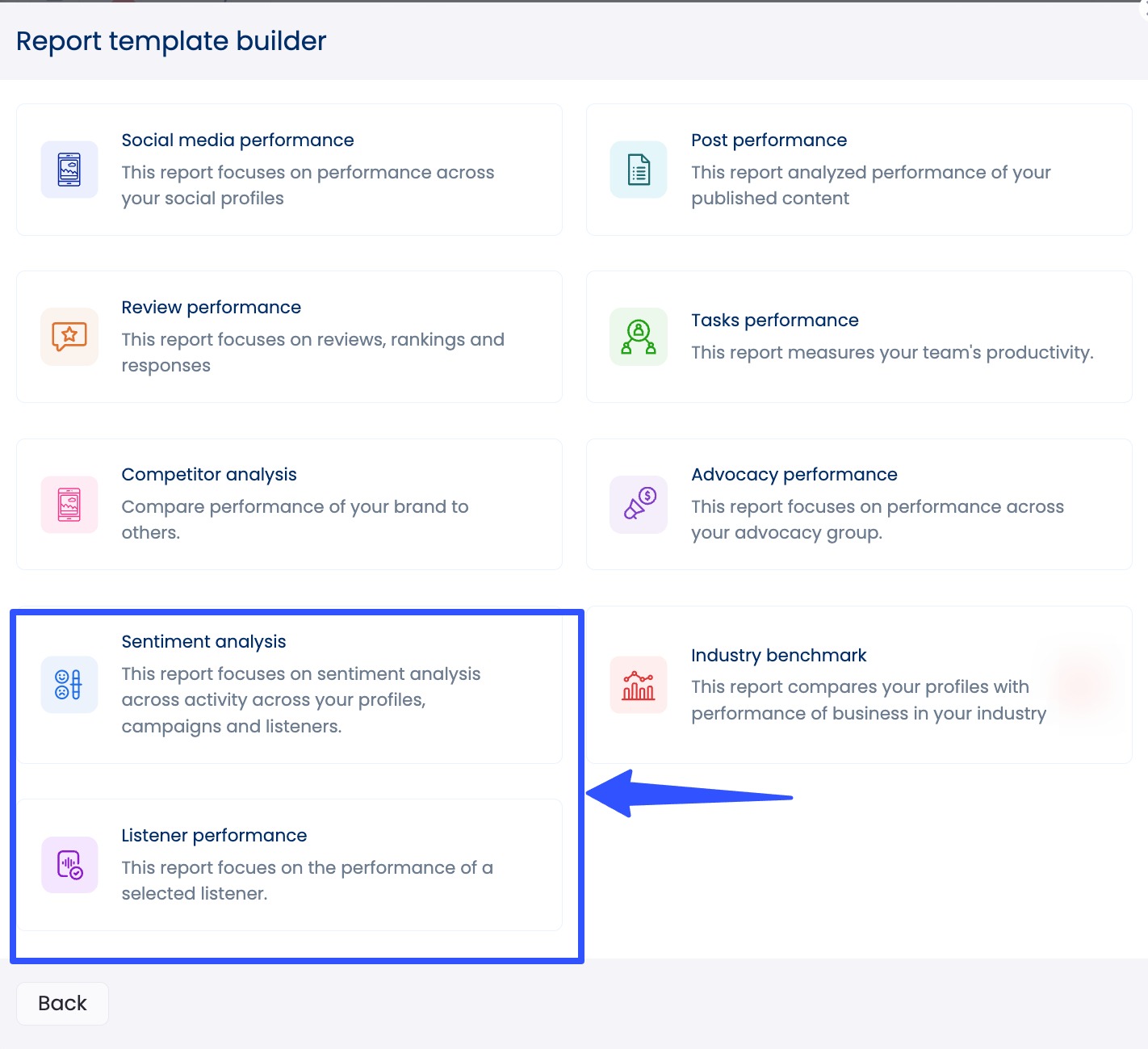
Select the metrics you want to include and customize your report sections and elements accordingly.
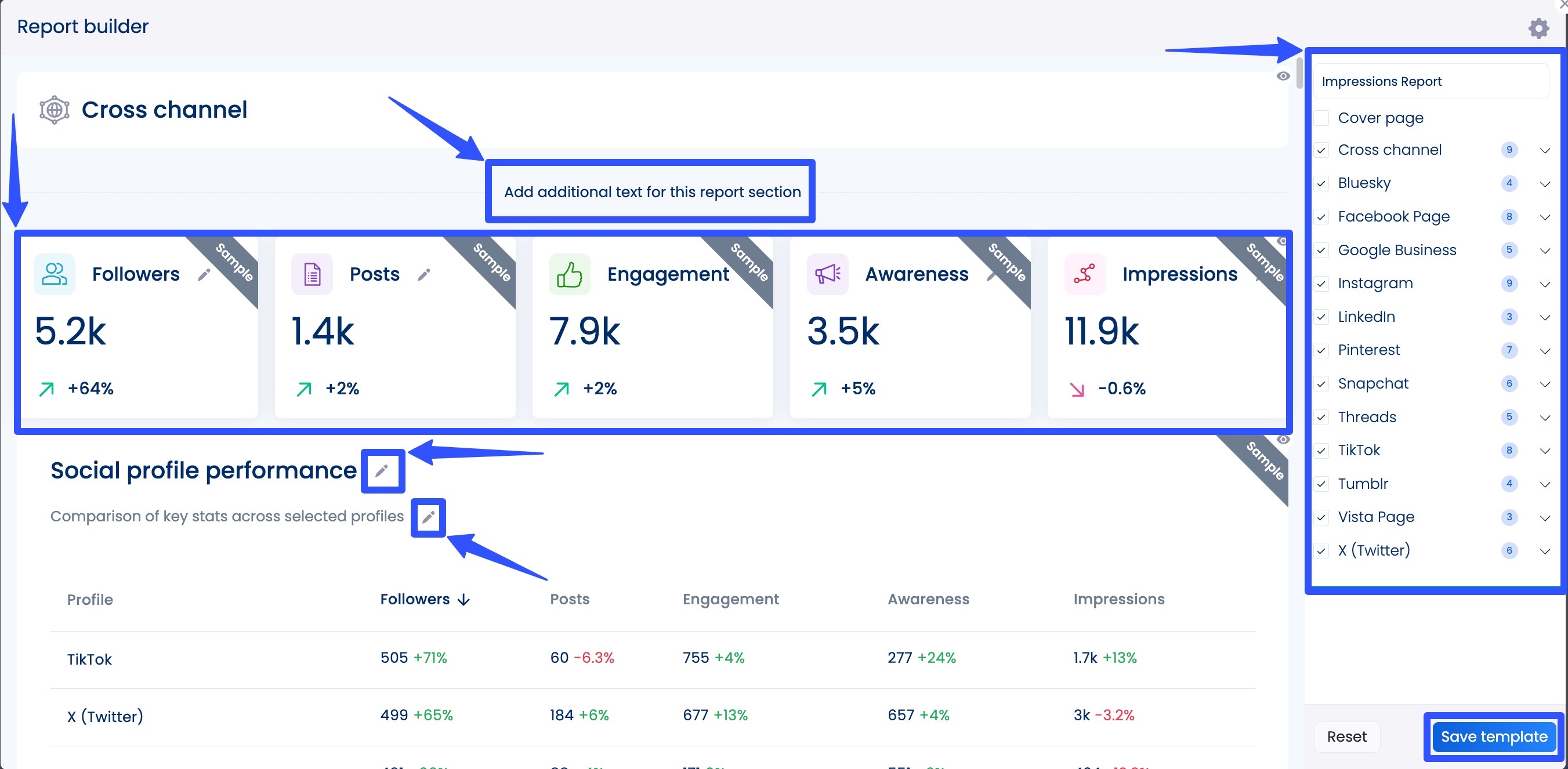
Save your template and run your report from the Report Builder or the Reports dashboard.
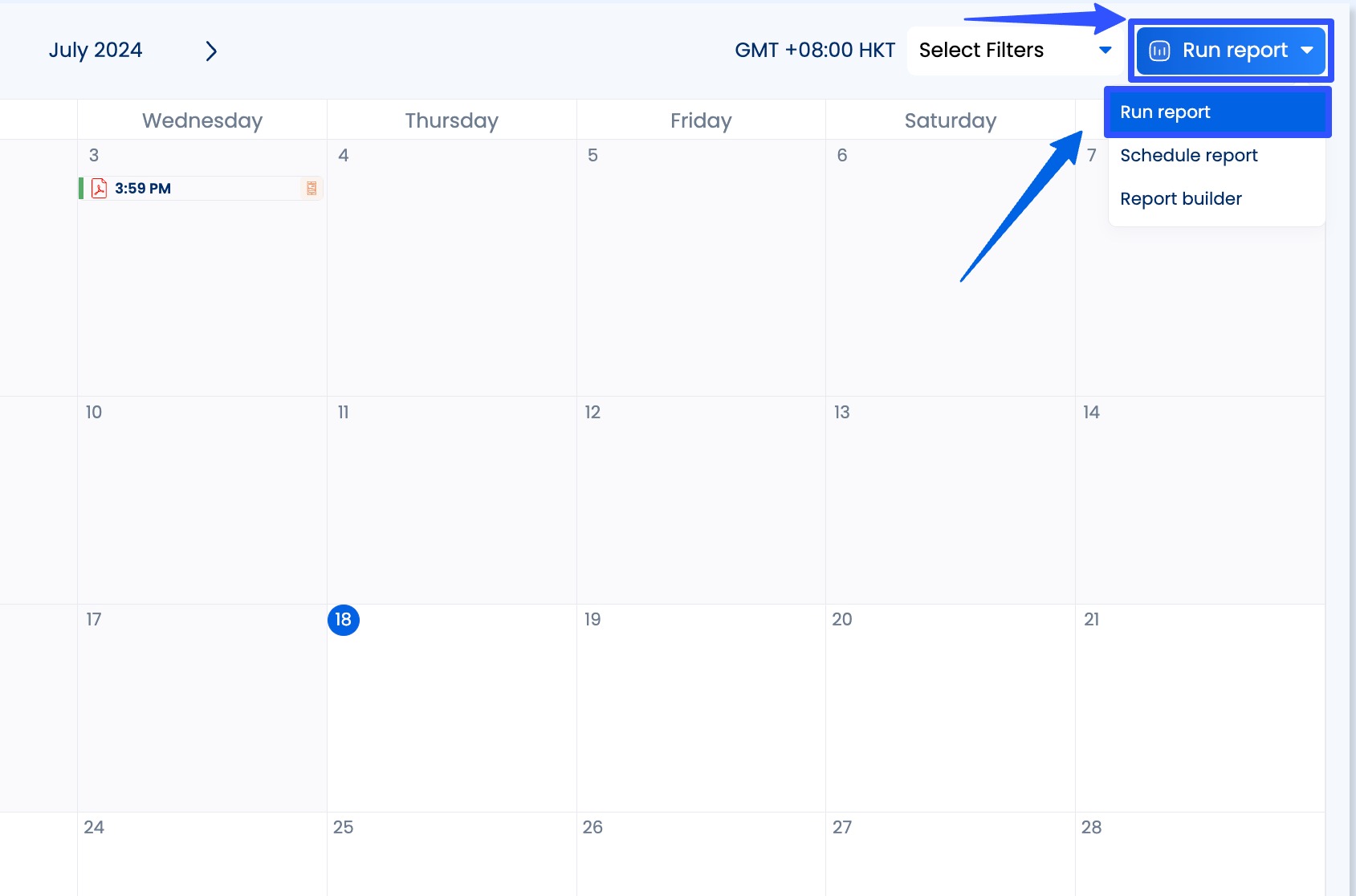
You can also schedule your custom reports by selecting them when setting an auto-reporting schedule.
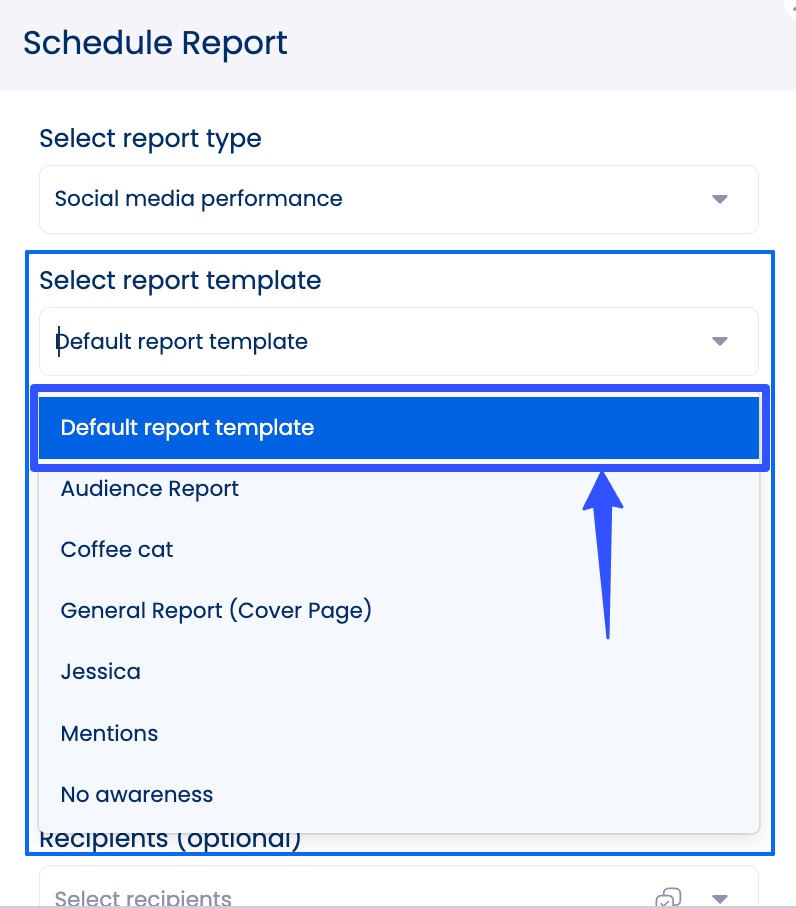
Check out the other features of Vista Social’s social media management toolkit.
- Content scheduling (bulk publishing, post queueing, smart publishing)
- Content calendar
- Optimal posting time suggestions
- AI Assistant
- Link in bio tool with customizable landing pages (Vista Page)
- Employee advocacy
- Review management
- Canva integration
- Automated post approval workflows
- Hashtag tools
- Visual content planner (Instagram and TikTok)
- Engagement and community management via a smart Social Inbox
Must read: Social Media Inbox Management Tools & Tips for 2025
Key metrics to track to measure social listening ROI
Below are the key metrics to monitor to help you measure the ROI of your social listening efforts.
Mentions Volume
The mentions volume is the number of times your client’s brand, products, or keywords are mentioned across social platforms.
The metric can show:
- Awareness and visibility growth
- How often people talk about your client
- How successful your client’s campaigns are at driving conversations
Consider tracking branded and unbranded mentions to catch everything, including indirect chatter.
Sentiment Analysis
Understanding how people feel about your brand is crucial for tracking changes in positive, neutral, and negative sentiment over time.
Tracking sentiment also helps you assess the impact of your clients’ product launches, campaigns, or even crisis management.
You know you’ve achieved a good ROI when your client’s sentiment improves after launching a new social media campaign.
Must read: 10 Social Media Sentiment Analysis Strategies for 2025
Share of Voice
SOV tells you how your clients’ brands stack up against competitors in conversations.
Do your clients lead the narrative in their industries?
Are people talking about your clients’ competitors more?
Higher SOV can mean your clients have better brand positioning and potentially more market influence.
Engagement in identified insights
Are you turning social listening data into action?
Track how your clients’ content, campaigns, or customer service improvements (inspired by social listening) perform in the following.
- Likes, comments, shares
- Click-through rates
- Response times and resolution rates (for customer support)
Keeping an eye on these numbers helps prove that social listening actively drives better outcomes and contributes to your clients’ ROI.
Leads or conversions from listening inspired campaigns
Uncovering audience pain points, trending topics, or unmet needs via social listening can spark powerful marketing ideas.
So, when launching a marketing campaign based on those insights—whether a new offer, content piece, or ad—remember to track the results based on leads, signups, or sales.
For instance, use UTM links and campaign tracking to connect the dots between your listening insight and the campaign outcome.
Crisis response time and recovery
Social listening helps you react fast, so tracking the following is crucial.
- Time from issue detection to response
- Sentiment change post-response
- Audience retention post-crisis
Quick wins here can save your client’s brand reputation, which is priceless ROI.
What are the common challenges of measuring social listening ROI?
Below are the common challenges you can face when determining the returns of your social listening efforts.
Hard to quantify outcomes
Some social listening benefits, such as customer loyalty or brand sentiment improvement, are qualitative, making them difficult to assign a dollar value to.
For example, it can be challenging to directly link a Threads post about a product tweak to an increase in customer retention.
Must read: 10 Social Media Customer Retention Tools for Agencies
Attribution complexity
Multiple touchpoints, such as content, reviews, and ads, often contribute to a single conversion, making it tough to isolate the impact of your social listening insights.
Even if social listening inspired a client campaign, proving that it alone drove conversions can be tricky.
Lack of clear Key Performance Indicators
Without predefined goals or key performance indicators (KPIs), measuring success meaningfully is challenging.
Many social media marketing teams dive into listening without knowing what metrics matter for ROI.
It can lead to data overload with little direction.
Data overload and noise
Social listening tools can surface thousands of mentions, but not all are relevant or useful for you and your clients.
Plus, filtering through irrelevant chatter to get actionable insights can be time-consuming and resource-intensive.
Time lag between insight and impact
The value from social listening insights, such as product improvements or branding changes, may take weeks or months to deliver actual results.
However, you can’t neglect the long term, since measuring short-term ROI may miss the long-term benefits entirely.
FAQs on social listening ROI
What is the basic formula to measure social listening ROI?
Calculating ROI involves comparing the value generated (such as increased revenue or reduced customer service costs) against the expenses incurred (such as personnel and tool subscriptions).
You can use this formula:

The calculation can help determine whether your social listening efforts yield a positive return.
Should you set specific goals for social listening?
Yes
Establishing clear objectives, such as improving customer satisfaction, increasing brand awareness, or boosting sales, can guide your social listening strategy and give you benchmarks to measure success.
Can social listening improve customer service ROI?
Yes.
You can identify common customer questions or complaints through social listening and proactively address issues.
It can lead to reduced support costs and enhanced customer satisfaction.
For instance, creating self-service resources based on frequently asked questions across your clients’ Instagram comments can decrease support inquiries.
Must read: Instagram Social Listening: What You Need to Know
Social listening ROI: Turning conversations into conversions
When done right, social listening can be a revenue-driving powerhouse.
Insights from social listening can directly influence your clients’ business growth, from spotting untapped audience needs to improving campaigns and customer experience.
The key?
Track the essential metrics, use the right tool, act on what you hear, and connect the dots to results.
Ready to see how powerful social listening can be for your brand?
Try Vista Social—your all-in-one social media management platform to monitor conversations, analyze sentiment, and turn insights into impact.
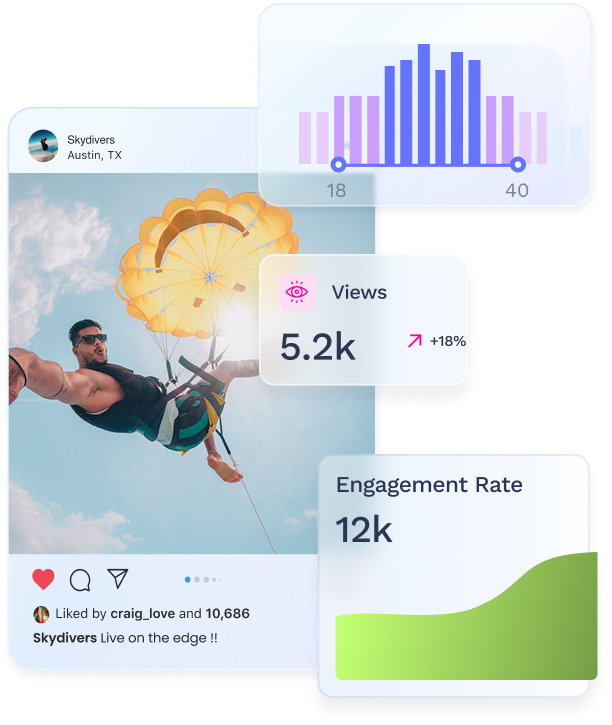
Try Vista Social for free
A social media management platform that actually helps you grow with easy-to-use content planning, scheduling, engagement and analytics tools.
Get Started NowAbout the Author
Content Writer
Jimmy Rodela is a social media and content marketing consultant with over 9 years of experience, with work appearing on sites such as Business.com, Yahoo, SEMRush, and SearchEnginePeople. He specializes in social media, content marketing, SaaS, small business strategy, marketing automation, and content development.
Read with AI
Save time reading this article using your favorite AI tool
Summarize with AI
Never Miss a Trend
Our newsletter is packed with the hottest posts and latest news in social media.
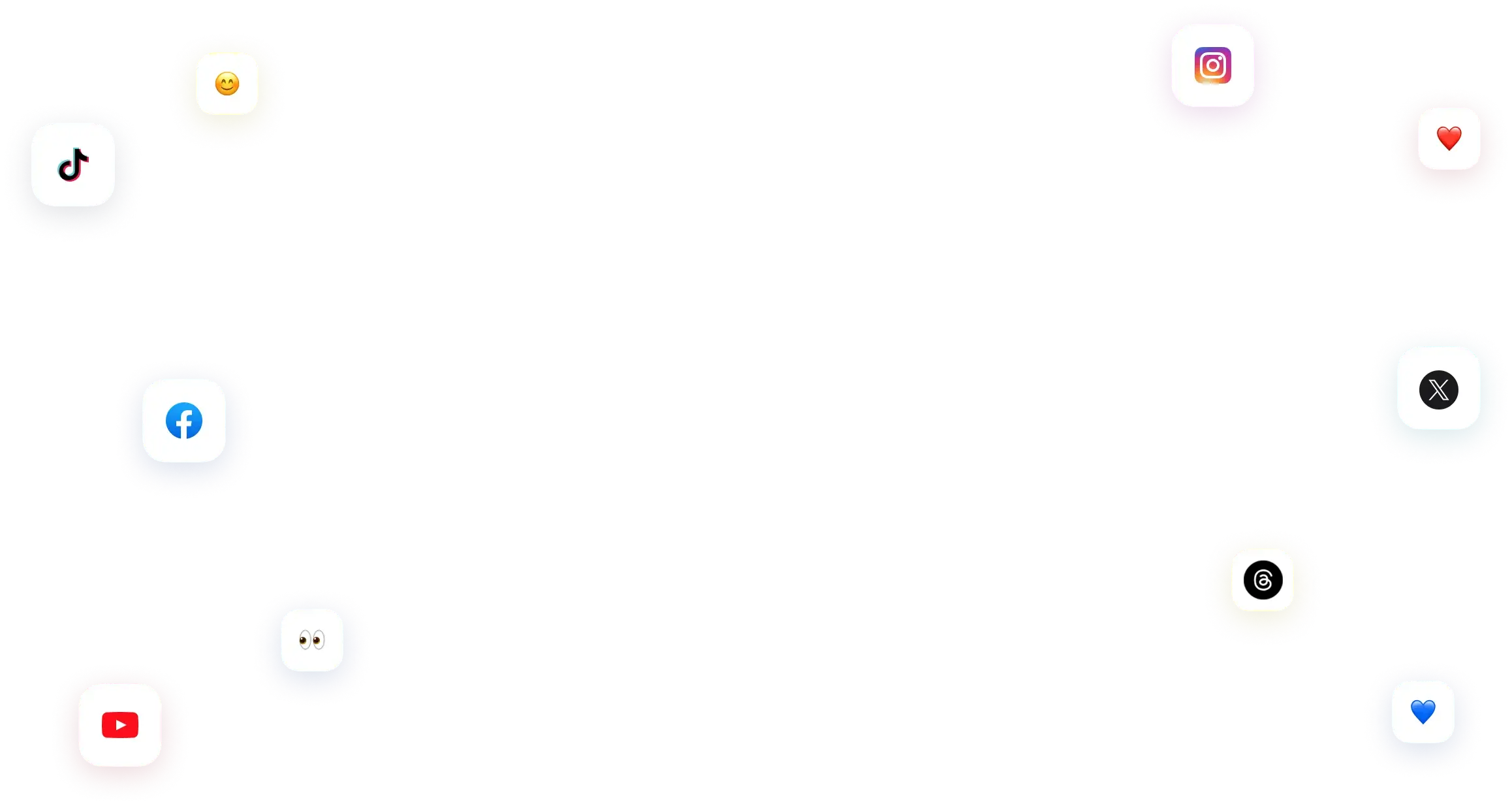
You have many things to do.
Let us help you with social media.
Use our free plan to build momentum for your social media presence.
Or skip ahead and try our paid plan to scale your social media efforts.
P.S. It will be a piece of cake 🍰 with Vista Social
Subscribe to our Newsletter!
To stay updated on the latest and greatest Social Media news. We promise not to spam you!
Enjoyed the Blog?
Hear More on Our Podcast!
Dive deeper into the conversation with industry insights & real stories.
